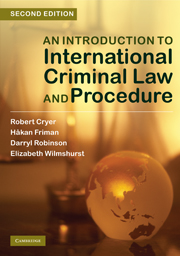Book contents
- Frontmatter
- Contents
- Preface to the Second Edition
- Table of Cases
- Table of Treaties and other International Instruments
- Table of Abbreviations
- PART A INTRODUCTION
- PART B PROSECUTIONS IN NATIONAL COURTS
- PART C INTERNATIONAL PROSECUTIONS
- PART D SUBSTANTIVE LAW OF INTERNATIONAL CRIMES
- PART E PRINCIPLES AND PROCEDURES OF INTERNATIONAL PROSECUTIONS
- 15 General Principles of Liability
- 16 Defences/Grounds for Excluding Criminal Responsibility
- 17 Procedures of International Criminal Investigations and Prosecutions
- 18 Victims in the International Criminal Process
- 19 Sentencing and Penalties
- PART F RELATIONSHIP BETWEEN NATIONAL AND INTERNATIONAL SYSTEMS
- Index
- References
17 - Procedures of International Criminal Investigations and Prosecutions
from PART E - PRINCIPLES AND PROCEDURES OF INTERNATIONAL PROSECUTIONS
Published online by Cambridge University Press: 05 June 2012
- Frontmatter
- Contents
- Preface to the Second Edition
- Table of Cases
- Table of Treaties and other International Instruments
- Table of Abbreviations
- PART A INTRODUCTION
- PART B PROSECUTIONS IN NATIONAL COURTS
- PART C INTERNATIONAL PROSECUTIONS
- PART D SUBSTANTIVE LAW OF INTERNATIONAL CRIMES
- PART E PRINCIPLES AND PROCEDURES OF INTERNATIONAL PROSECUTIONS
- 15 General Principles of Liability
- 16 Defences/Grounds for Excluding Criminal Responsibility
- 17 Procedures of International Criminal Investigations and Prosecutions
- 18 Victims in the International Criminal Process
- 19 Sentencing and Penalties
- PART F RELATIONSHIP BETWEEN NATIONAL AND INTERNATIONAL SYSTEMS
- Index
- References
Summary
International criminal procedures
Introduction
From the Nuremberg trials and onwards, the need to develop a new procedural system for any new international criminal tribunal has been acknowledged. Such a procedural system would be sui generis in the sense that it would depart from any one domestic system or legal tradition. But, inevitably, it would have elements from the major domestic legal systems of the world, also enhancing the perceived legitimacy of the tribunal and its proceedings. In this chapter we will focus on the procedures that have developed for the ICTY, ICTR and ICC and consider how they blend elements from different legal traditions.
Different legal traditions
There is a significant distinction between the criminal procedures of two major domestic legal traditions: the common law tradition (or Anglo-American tradition) and the civil law tradition (or Continental or Romano-Germanic tradition). While these traditions go beyond the system of criminal procedures, the common law model is said to be ‘adversarial’ or ‘accusatorial’ and the civil law model ‘inquisitorial’. No domestic system represents a pure model, however, and there are considerable differences between systems belonging to the same tradition. Moreover, some systems, e.g. in Scandinavia, do not really belong to either of the two traditions. In spite of shortcomings, we will here use the terms ‘adversarial’ and ‘inquisitorial’ to describe in a general sense differences attributed to the two traditions, but also, on occasion, resort to the common law and civil law labels.
- Type
- Chapter
- Information
- An Introduction to International Criminal Law and Procedure , pp. 425 - 477Publisher: Cambridge University PressPrint publication year: 2010



